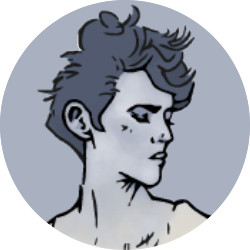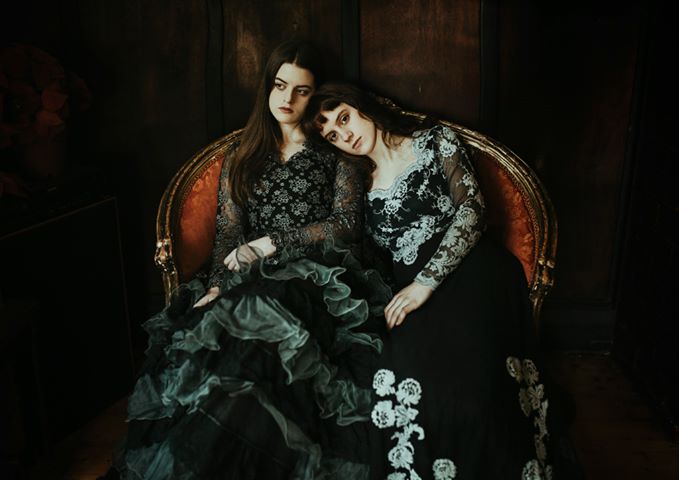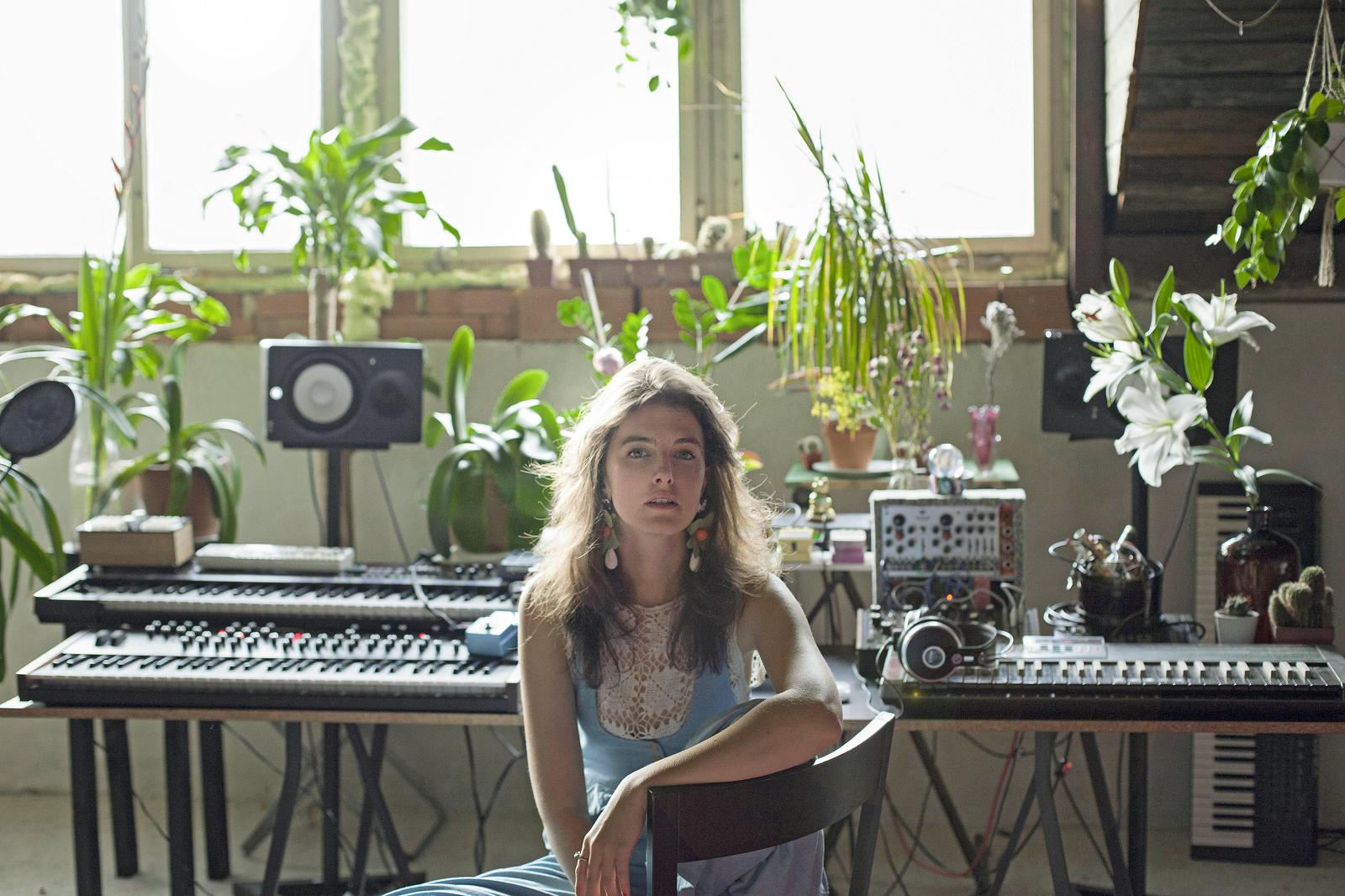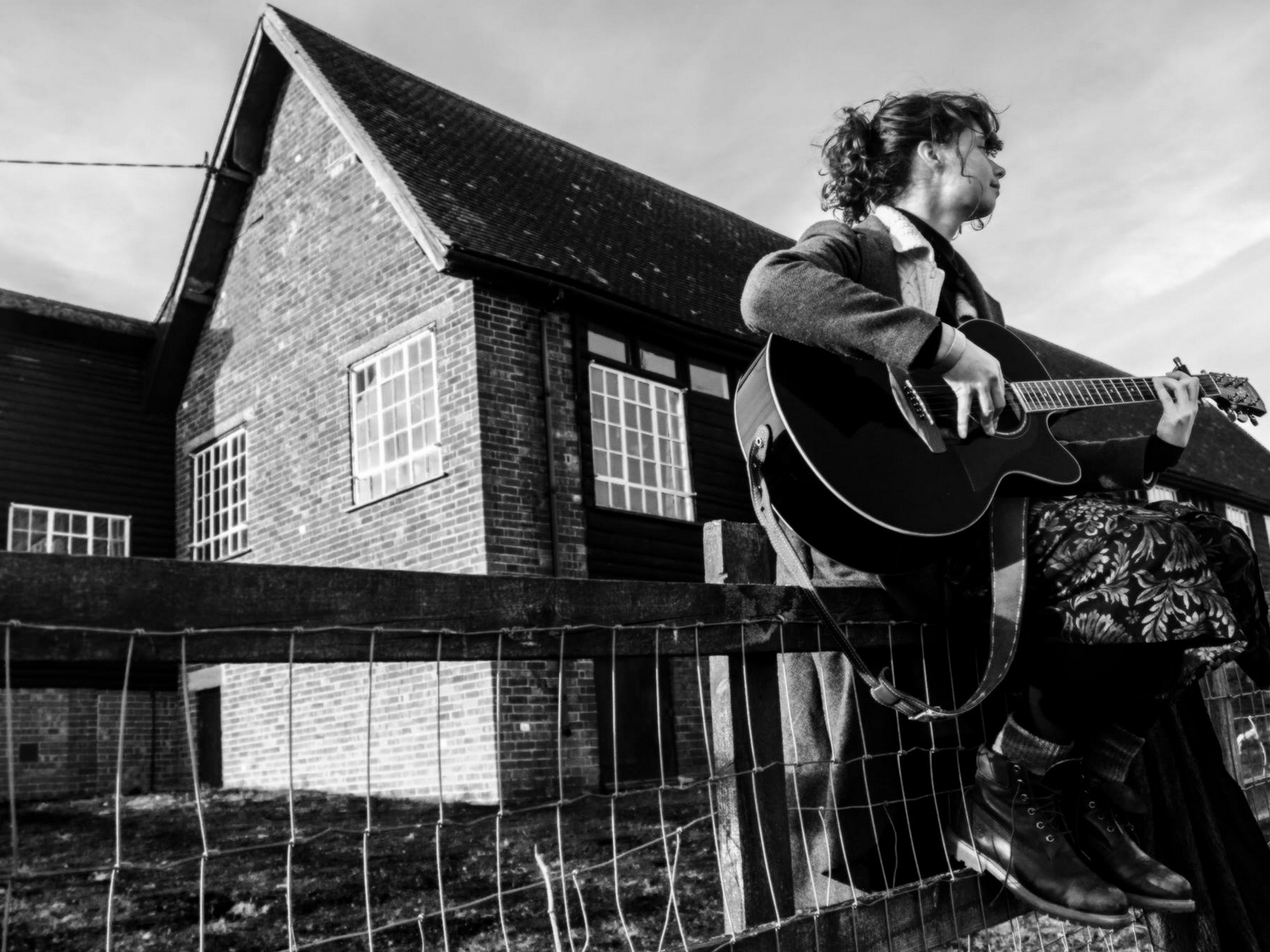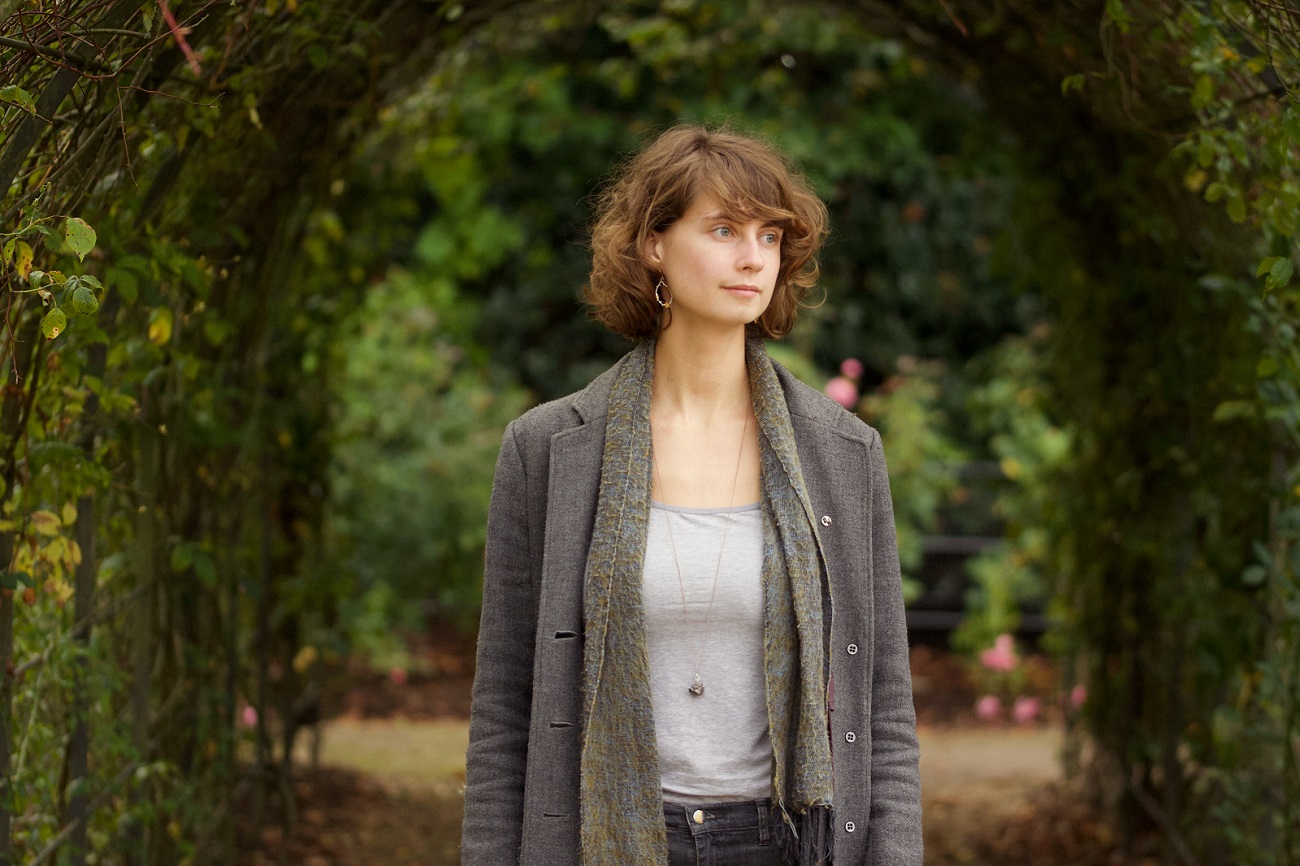 Photo credit: Dean Evans
Photo credit: Dean Evans
The Interview
When did you decide that you were ready to start working towards a new record, and was there anything specifically that solidified it in your mind as a serious project that you would see through to its conclusion?
Rosie: I think it was a conglomeration of events. I was definitely getting the itch to record stuff — maybe before I’d got the material — but if I did another record, I wanted it to be more of a body of work and less a collection of random songs. It came hand-in-hand with the realisation that I’d been keeping my art and my music separate in my mind and in life, and I’d been writing songs that were another outlet for thinking about the concepts I was exploring in my art. I was like, “Well, obviously. That makes sense because it’s my brain.” [laughs] Then I wrote one key song, which was the title track, The Lost Gardens, and that was just it. I was like, “Oh, I’ve got at least three songs now that are using kind of garden imagery. I think I have something! I have a theme.”
It all happened to be good timing that Jakes and Niko, my sound engineers, and Upcycled Sounds got properly setup with a studio in Oxford, and they were just raring to go and ready to start. I only had four songs at the time, and I knew I wanted five. I thought a lot about doing an album or an EP — the pros and cons — and we decided that an EP was a really good way of getting music out more quickly, and more focused as a project as opposed to an album, which can end up quite rambly. So, it came together at the beginning of last year, and we threw ourselves into it.
You mention the cohesiveness, specifically from a thematic perspective. Did you enjoy working within that framework once you realised that’s where you were heading?
Rosie: I didn’t realise quite how cohesive it all was until we finished and put the tracklisting together. I think even though I knew it was more cohesive, it was more the pleasure that I knew I was proud of the songs — I knew that they were good. With Inside Out, it was like I was prepared to record them and put them out there because I thought they were okay songs… That sounds terrible. They were meaningful, so I thought that was grounds enough to put them out, but with the songs I wrote for The Lost Gardens, I felt proud of them as good songs. That’s what was really enjoyable about recording them as a set.
We spoke last time about this being quite a relaxed project for you – how you’d deliberately kept things casual for fear of it dying – have you been able to preserve that attitude through the process of this latest record?
Rosie: Yes, I think so. Music in general is still that for me, and I’m much more clear on that now than I was three years ago. I was kinda like, “I dunno, I’ll just see what happens”, and I felt a bit guilty about that, like maybe it was just a lazy attitude. But actually, now, I really want the music to remain enjoyable, and I think the key to that is to keep it like, “Let’s see what happens. Let’s just try this out.”
But I don’t have an end goal, and I don’t have my sights set on anything in particular. Last year was pretty full-on music-wise, and it took up way too much of my time for how much it paid me. That was fun, but I have to be really aware of it. It’s energy sapping. My mantra for this year, and forever, I think, is to be open with music, and never to say no, but equally I’m not gonna pursue anything — much to the dismay of my production team. [laughs]
And compared to your album, how have you found yourself responding to the actual release of this EP: the letting go of it?
Rosie: I think my attitude to that has changed as well. It’s because the creation of the album, and then the launch and the gigs afterwards, have been a lot more collaborative than with my album, which was collaborative as well, but with the EP I very much more handed over trust to other musicians.
I remember, just before we started recording, I was still having anxieties about ownership of the songs. Handing over everything production-wise, and letting them play around with whatever they wanted in the studio, took a lot of, ‘Okay, what does that mean of those songs once they’re done? How much are they still mine?’ My problem with that quandary isn’t to do with wanting them to be mine, it’s more to do with how I feel guilty about then selling the CDs and getting the proceeds just for me. I had the same issue with Inside Out — I felt really bad about it. I was like, “This is eighty percent someone else’s work.”
I had lots of conversations with Niko about that, and he just kept reassuring me, like, “No, they are your songs. They can be displayed and worked with in hundreds of different ways, but the song is still yours.” The whole way Upcycled Sounds was set up in the first place, they really want it to be clear that the song is owned by the songwriter who pays for the production. That’s a job that’s been done, and the song is still completely owned by the artist at the end. I think that all helped me let go of them to a certain extent, and enjoy it. It’s been really fun. I feel like everyone’s reaction to the EP has been that of surprise and enjoyment of how much it’s opened up, and that’s all down to the production team, but also the collaboration between both of us. I’m much more aware of how that EP couldn’t exist without both our things coming together.
So, would you say you’ve now completely gotten over that particular doubt?
Rosie: Yeah, I think so. Having a band around me, I’ve started to see how people actually just get a lot of enjoyment out of it. I should stop feeling weird about that. Now I know where my strengths lie, where they don’t, and where I can invite others to contribute in order to progress things in a way I couldn’t on my own. I shouldn’t feel guilty about that — I should just enjoy the fact they’re enjoying it, and we’re all enjoying it together. [laughs]
How has all of this impacted your live show?
Rosie: It has definitely raised some questions. It was exciting what we developed on the EP, and how we broadened the sound. We came to the end of it and were like, “Great! How do we bring that onto the stage?” Because it feels like a really great leap forward, and it would be really cool to bring that progression into the live performance, but I’ve always avoided bands because it takes a lot of logistics and is a bit of a nightmare. But, that all quite happily fell together, accidentally.
Some of the artists on the label — we all just kind of collaborated on each others songs. Then we were trying to take the recordings, and not replicate them for on stage, because they’re two different things, but to take some of the elements of the recordings: to put my guitar down and hand over that instrumentation side of the performance to these other instrumentalists; to trust them to find their parts with what they’d heard on the EP, and what my live performance was like. Instantly, it was really exciting, and they really enjoyed it, which was what mattered to me. I’m not gonna employ band members just for the hell of it — the only reason I’m doing it is because they’re enjoying it.
As a bonus, it’s unlocked a whole different level of performing for me, which I never could have imagined before. The amount of fun you can have on stage when it’s not just you. You can actually own your craft in a much more poignant way — I can really focus on my vocals, which is what I really care about and enjoy. The part I didn’t enjoy so much, which was the guitar, I can hand over and they can enjoy it. So, it’s been really great.
Will you be doing more shows with the band?
Rosie: I want to, and they want to, but it’s just that difficulty of us all doing it on the side. When there are five of you doing it on the side, the chances of you getting in one room at the same time for a rehearsal are slim. We’ve done a few gigs recently where we hadn’t rehearsed at all, which they’re very good at — at winging it — but I don’t really want to wing it. If I’m going to do it with the band, I really want to be rehearsed. So, that’ll take a different investment of time and money.
I’ll say yes to things if they come up, but I don’t have that space — I’m gonna have to be focusing on my artwork a lot this year, because last year was a music year. This year, I need to lock down and focus. I think what I’m planning, in build up to the next record and producing it, is involving the band a lot more. Then we’ll see about touring and scary stuff like that. Next year, maybe.
Okay, so returning to the EP itself: Were you more, or less, concerned about the reaction this time around?
Rosie: I guess, naturally, more, because I think you always are with every new project — you feel like you’ve progressed, and you want that confirmation from the outside.
Last time we spoke, you said that you’d like to introduce a slightly more electronic influence, and a very noticeable way in which this EP differs from your album is the production. In this particular respect, how close is the EP to what you were envisaging three years ago?
Rosie: I’ve kind of taken stepping stones with Jakes and Niko towards that — keeping my songs pure. I didn’t want to suddenly go over-electronic; I didn’t want to suddenly become, you know, current. [laughs]
I loved what what Chris did with the instrumentation (for Inside Out) — it was beautiful — but the reason I can’t listen to the album much at the moment is purely because of my performance. I feel like I over-performed it, I was overexcited, and it was all a bit much. I’m aware of the fact that my songs are already quite a lot to absorb, and the instrumentation needs to bare that in mind — we kind of just threw everything at it. Chris came up with loads of arrangements for loads of different instruments, and I was like, “Yeah! Sure! Try that! Throw it on!”
I’ve realised since that I need to pare things down somehow and yet keep it real — I love knowing that a sound actually happened. I know synthesisers use sounds and then work with them, but I like the idea that everything really did happen in the studio. That’s what Jakes and Niko do. It sounds more electronic, but actually all of those sounds were created uniquely for the project; mostly, they didn’t take samples from a database and mix them in — we made them, by hitting things in the studio, and shaking random objects.
I think it became a lot clearer to me, when I had a lot of distance from the album, what I actually wanted the sound to be like. It took me a long time, and I really struggled with hearing it. Really, I think I’m only clear on that now that we’ve done it — in the studio, I was like, “Try whatever.” But I think Jakes and Niko had a lot of clarity about it, and that really helped. They knew it needed to be simplified, not over-complicated, yet they also wanted it to be fresh and interesting. So yeah, Jakes and Niko really helped to have that clarity, and now I feel a lot more clear for the next one.
It feels like it worked as a concoction of people and minds. It was quite experimental, but now we can see what worked and what didn’t. It’s nice. I can imagine doing something more, which I don’t think I was that clear on after Inside Out.
Is there anything you left off the album that, on reflection, you wish you’d included, or anything that could have been done slightly differently?
Rosie: I think the only change I would make to the EP is something I suggested that I now think I was wrong about. [laughs] Niko’s gonna love this; I haven’t told him. Towards the end of the mixing, I kept asking him to turn me up. You know Laura Marling’s new album, and the song Soothing? I was thinking very much in those terms: it’s all about her delivery. It sounds really egocentric, but the lyrics are so important to me. I didn’t really know what was going on with the instrumentation, but the point of the song — I really want that to be in the front. So, I kept prodding him to turn it up in the mix, and he was just like, “You’re already really loud!” I was like, “No, I’m not! Not loud enough!”
I do like it, but I have had a comment from another sound engineer that was like, “That was quite brave: to put you so forward in the mix.” Yeah, that was my fault. So, I think I need to trust Niko’s opinion more on the stuff that he’s trained at. I think that’s the only change I would make.
There was something we left out that was in the mix for The Lost Gardens, which I stand by. Niko used a lot of field recordings, and one of the main ones was a recording he’d taken of ants crawling over his microphone — they were making squeaky noises and spraying defensive stuff. He mixed it into quite a lot of the song, and he loved it. Everyone else loved it. They were like, “That’s so cool!” But I was determined, and I know I’m in the right about this: it was just a distracting, weird sound. You’re just like, “Are my headphones broken?” [laughs] The other aspect of it is that I have a phobia of ants. [laughs] So, it would have been quite ironic to keep it in there, but it was also like, “I’m never going to be able to listen to this song. I feel like they’re in my head.”
Other than the fact ant sounds are definitely not for you, is there anything you’ve learnt about yourself from the creation and release of this record?
Rosie: I’ve learnt to trust the fact that things are connected, and things happen for a reason; to trust that they’ll mesh together successfully, and to not be so worried about not having a grasp on what it’s going to sound like, be like or look like. So, definitely to trust my process, and to trust other people more. Other than that, I’m not really sure. I still don’t know much about myself. [laughs]
How do you feel you’ve developed as a lyricist since the album?
Rosie: I’m still learning. I can see now what’s more successful about these songs. There are a lot of people who have a huge place in their heart for the songs on Inside Out, but I think, technically, they’re definitely better songs on The Lost Gardens. I always write really rambly, and there are aspects of those songs that maybe are still too rambly. But I think, on the whole, with the input of Jakes and Niko, we did cut out quite a lot of random bits of verses that I was holding onto because I really liked them lyrically. But to make a good song that people could follow — could audibly go on the journey with me — it needed to keep their attention, and in order to do that, I have to sacrifice some lyrics.
I wrote a song recently that’s just been taking so long, because I had too much of an idea of what I wanted it to be about, and I was hammering that home way too much and in a really obscure way. It was really hard to follow, and I rewrote it three or four times. I think I’ve only just got it to a stage where I can bring it to the band and see what happens with it. It took a lot of sacrificing ideas in order to make a good song, and that’s hard, but also an important part of the process that I’m learning. It does come across in a shorter amount of words. I have to believe that people will get it; I don’t have to spell everything out.
I get the impression from the way you’ve conveyed that point however, that removing something from an original work for the betterment of a song is something you’re still struggling with a little.
Rosie: If you gave me a week off from my life, I couldn’t guarantee you that I could come up with a song — maybe an idea, but it’s still a mysterious process to me. I have more of an understanding of it but, in a way, that’s more of a risk. Sometimes I feel like I want to have less of an understanding, because I feel that holds me back. I used to write songs way more regularly — just spit them out — but now I definitely feel that my awareness makes me overthink things. I’m hoping that will all balance out and I’ll become productive again, but it’s a hard thing, writing songs.
I can imagine; I find it hard enough writing emails. The amount of time I can spend tweaking a two line message…
Rosie: [laughs] It happens when you really care about what you’re saying. If you really care then of course it’s hard. There are a million different ways you could get the words out, and you want them to be the right words. There’s so much pressure on that, and people who write a lot of songs, maybe they’re just better at letting go of that pressure, or maybe some of them just don’t care as much. [laughs] They just get it out and think about it later, and if you wanted to make a career in songwriting, you’d need to do that. But I’m not prepared to sacrifice my pernickety songwriting. [laughs]
Okay, so what does this EP represent to you.
Rosie: For me, in both my art and my music, it marks a kind of clarity. No matter what my songs are about on the surface, they are all dealing with a similar theme and ideas — that’s quite refreshing to realise. I think I’ll always be trying to express that in some way or other, whatever imagery I’m using at the time. I can see how, even though I’ve only got one or two songs for the next record, it leads on in terms of the underlying themes, which will be the same: ideas about finding stability in a world that’s so chaotic and turbulent, and also the dangers of veering too much to that side and wanting too much stability and too much control — what that can mean and how that can hold you back.
It’s weird, I feel like I’ve been having this epiphany for the last four years — I have the answer, but to get there is gonna be a lifelong process, and the songs are an important part of that for me. That’s exciting, I think. I see songwriting as less random than I used to.
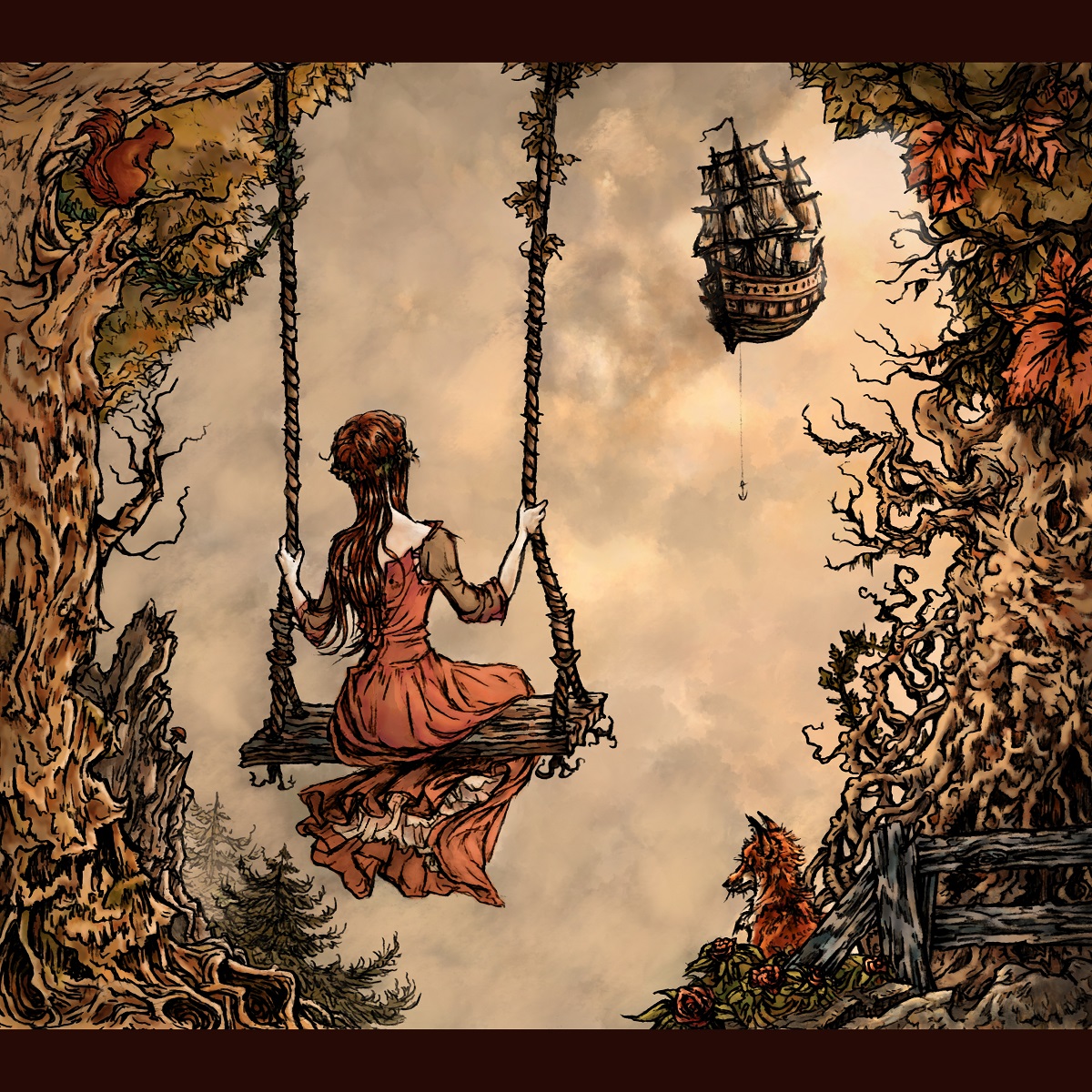 Rosie Caldecott featured onBeautiful Songwriting 4
Rosie Caldecott featured onBeautiful Songwriting 4Stay updated with Rosie on Facebook and Instagram, and stream or purchase The Lost Gardens on Bandcamp.
If you enjoyed reading this interview and happen to think we're doing something right, please consider sharing the link -- whether on social media, or just with a friend, it'd really help us out! We're also on Facebook, Instagram (@alonelyghostburning) and Twitter, so if you'd like to keep up-to-date with the publication of new content, and also provide us with a whole heap of motivation, please do give us a like or follow.
